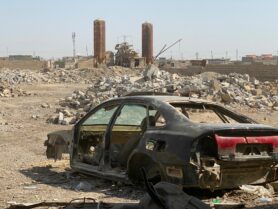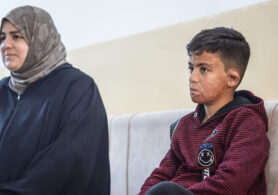The Remote Warfare roundup is a bi-weekly digest of unfolding news, op-eds and reports relevant to remote warfare. This round-up is written by Aoife Keogh.
“The Covid Effect” – Civilian Harm decreased in 2020 according to Airwars
Airwars released their Annual Report for 2020 earlier this month. The report tracks multiple conflicts detailing locally reported civilian deaths due to explosive weapons. Their report finds that civilian deaths due to explosive weapons are down by two thirds from the previous year. Of these deaths, over half of them occurred in the first two months of 2020. Airwars argue that the spread of the Covid-19 virus is partly responsible for the reduction in civilian deaths from explosive weapons, labeling this phenomenon “the covid effect”.
They also list other factors responsible for the reduction in figures including the scaleback in drone strikes in Yemen by the United States and truce deals in both Libya and Syria. However, the pandemic of Covid-19 did not subside all military operations, there was an increase in counter-terrorism operations in Somalia and the Turkish military still conducted assaults in Syria and Iraq.
The report details US military actions finding that Donald Trump’s last year as U.S President saw 1,000 airstrikes which compared to 13,000 in Barack Obama’s final year in office which is a significant reduction. However, the report asserts that there is still a lack of public accountability with U.S military operations.
In Syria, the Assad regime and Russia still operated air strikes targeting rebels in several parts of the country, these halted after the March 5th ceasefire. However, in the two months prior Russian forces were responsible for 398 civilian deaths. Military operations by the Turkish military led to 37 civilian deaths and more injuries in Syria. In Iraq, the Turkish military is reported to be responsible for 27 to 33 civilian deaths.
Airwars Director Chris Woods welcomed the reduction in civilian deaths but stated that concerns for the reemergence of these conflicts after the Covid-19 pandemic receded must be taken seriously.
Biden Administration Limits Drone Strikes
The Biden administration has imposed a temporary limit on drone strikes outside of battlefields in Afghanistan, Syria and Iraq. The temporary limit is in place to allow officials to review how much autonomy will be given to the military and the CIA in counter-terrorism operations.
The restrictions came into place on January 20th of this year requiring the CIA and the military to seek White House approval before orchestrating kill or capture missions in states with fewer U.S troops operating on the ground such as Somalia, Libya and Yemen. The restrictions come as the National Security Council are conducting an investigative review into the legal and policy frameworks of operating drones.
This news comes after President Biden authorized his first airstrike in Syria at the end of February. The strike targeted members of the Iranian backed militias Kataib Hezbollah and Kataib Sayyid Al-Shuhsada. The attack is reported to have killed 22 civilians after hitting three trucks carrying munitions outside the town of Abu Kamal near the Iraqi border. The U.S claimed the strike was in retaliation for attacks in Erbil earlier that month which killed one civilian contractor and injured members of the U.S military.
The U.S strike amassed criticism as it was conducted in Syria despite the U.S claiming it was in retaliation for the attack in Erbil, Iraq. As quoted in the Guardian Professor Mary Ellen O’Connell of Notre Dame law school argued it “the United Nations charter makes absolutely clear that the use of military force on the territory of a foreign sovereign state is lawful only in response to an armed attack on the defending state for which the target state is responsible,” she said. “None of those elements is met in the Syria strike” (McKernan et al, 2021).
President Biden was Vice President in the Obama administration, which carried out 10 times more airstrikes than the predecessor George W. Bush. Airstrikes were a large part of the Obama administration’s strategy for engaging in military operations in the Middle East and North Africa. These airstrikes allowed for less troops on the ground, avoiding ground wars which are costly and unpopular with U.S public opinion. The Obama administration garnered criticism for their representation of these strikes as ‘surgical’ and ‘precise’ with minimal civilian casualties, a narrative which is heavily contested by human rights groups with proof suggesting otherwise. To read more about the contested narratives of remote warfare read Perfect War and its Contestations written by founders of IRW Dr. Lauren Gould and Dr. Prof. Jolle Demmers together with our valued member David Snetselaar.
Does President Biden’s first airstrike pave the way for his foreign policy going forward or does the temporary limitations mean that he will not be following in the Obama administration’s footsteps?
Sources and more information:
- Read more about the Biden Administrations temporary limit on Drone Strikes.
- Read about President Biden’s first Airstrike in Syria
- Read more about the Obama administration’s legacy with airstrikes.
U.S Special Forces sent to train Mozambican Troops
The U.S has sent a small military group into Mozambique to train local fighters in an attempt to suppress the insurgency occurring in Cabo Delgado, a region in the north east which contains the world’s largest natural gas reserves. The insurgents which the U.S formally labels the Al-Sunna wa Jama’a (ASWJ) known locally as Al-Shabaab (distinct from the Somalian terrorist group) are responsible for the deaths of an estimated 2,000 civilians and the further displacement of 670,000 civilians.
The U.S has claimed the group has links to the Islamic State, although it is unclear how strong these links are, experts fear this label may hinder efforts to end the insurgency through negotiations.
The U.S special forces will join the South African mercenary group Dyck Advisory Group who have been fighting in the region alongside the Mozambican army. A recent report from Amnesty International has accused the ASWJ, the government forces and the Dyck Advisory Group of being responsible for human rights abuses in the region.
Alongside training the U.S military has also agreed to increase surveillance in the region.
The deployment of U.S troops in Mozambique is part of the larger U.S Africa Command (AFRICOM). Since its inception in 2008 AFRICOM has increased the number of military personnel from 2,600 to 7,000. Furthermore, the number of military missions and activities has also expanded from 172 to 3,500. Many of these activities involve providing training for local fighters, operating surveillance and conducting airstrikes. AFRICOM contends this is necessary to promote regional stability and fight violent extremism. However, since starting in 2008, there has been a significant increase in terrorism incidents across Africa, leading to criticism that the US militarized approach is not counteracting security threat but may actually be contributing to them. As quoted in The Intercept, the director of the arms and security project at the Center for International Policy, William Hartung argues in relation to AFRICOM that “If anything, attempting to eradicate terrorism by force may be exacerbating the problem, provoking a terrorist backlash and serving as a recruiting tool for extremist groups.” (Turse, 2019).
IRW founders Dr. Prof. Jolle Demmers and Dr. Lauren Gould coined the term liquid warfare to refer to the changing dimensions of military interventions like that of AFRICOM’s mission in Mozambique. According to their article “Liquid warfare is about flexible, open-ended, ‘pop-up’ military interventions, supported by remote technology and reliant on local partnerships and private contractors, through which (coalitions of) parties aim to promote and protect interests. Liquid warfare is thus temporally open-ended and event-ful, as well as spatially dispersed and mobile” (Demmers and Gould, 2018, p. 366).
Sources and more information:
- Read more about the unfolding situation in Mozambique.
- Read the amnesty report alleging human rights abuses in Mozambique.
- Read more about the US Special Forces and AFRICOM.
Russian Mercenaries face legal action for alleged conduct in Syria
Private military organisations are commonplace in contemporary conflicts and are a frequent feature in remote warfare. They are often referred to under different labels such as the former; paramilitaries and mercenaries. They operate on the ground in warzones, doing the bidding of state actors while providing them with distance from the violence orchestrated and as a result blurring the lines of responsibility.
On the 15th of March three human rights organisations announced that they will be taking legal action against members of the private military organisation Wagner. The private military organisation was deployed alongside Russian forces who intervened in the Syrian conflict to assist the Assad regime in 2015. The three human rights groups taking legal action include The International Federation for Human Rights (FIDH), Memorial and The Syrian Centre for Media and Freedom of Expression. These organisations filed the criminal complaint in Moscow on behalf of the family of a Syrian man who they alleged was executed by members of the Wagner group for deserting the Syrian Army in 2017.
It has been 10 years since the beginning of the Syrian conflict and the violence enacted over the last decade is now being called into question. This case follows a procession of other legal cases being brought to court against affiliates of the Assad regime in countries such as Germany, Norway, Sweden and Austria. The three NGO’s claim that this legal case is the first of its kind as it attempts to shine a light on the often overlooked conduct of private military organizations operating in warzones.
For more information about the case.



